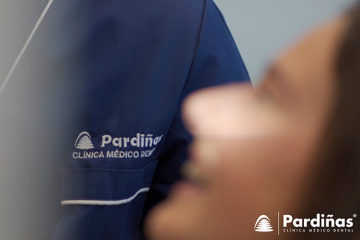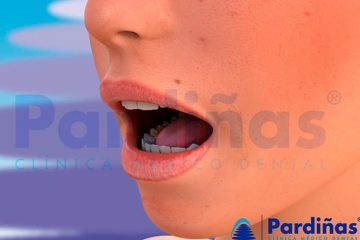Taking care of our mouth is not only important for oral health. The oral cavity is the gateway for many diseases that can affect the rest of the body. Here are some tips to keep your mouth healthy.
-
1) Brush your teeth after every meal
-
2) Diet is an ally to keep the mouth healthy
-
3) Staying hydrated will help your oral health
-
4) Alcohol, tobacco and drugs, a very harmful combination for our teeth and mouth
-
5) How to keep your teeth white
-
6) Control bad breath
-
7) Oral piercings are a source of mouth problems
-
8) Biting your nails is not going to help keeping your mouth healthy
-
9) Teeth are neither scissors nor can openers
-
10) Protect your teeth if you play contact sports
-
11) Do you suffer from bruxism? Go to your dentist
-
12) Stress is an enemy of oral health
-
13) Do you practice oral sex? Take precautions
-
14) Have you lost any teeth? Replace it as soon as possible
-
15) Visiting the dentist regularly will help keep your mouth healthy
1) Brush your teeth after every meal
The first step to achieve good oral health is to have proper dental hygiene, avoiding the accumulation of plaque and tartar. It is advisable to brush your teeth after every meal with the proper tools and technique. It is important to spend some time cleaning the tongue and cheeks, since many bacteria also accumulate there. Likewise, the use of dental floss at least once a day is recommended to remove debris between teeth and avoid interproximal cavities. The use of interdental or interproximal brushes and/or the dental irrigator is also recommended in patients with periodontitis or with prostheses and implants.

2) Diet is an ally to keep the mouth healthy
Our diet and our oral health are closely related. For this reason, it is advisable to privilege the consumption of fruits and vegetables over other products, and reduce sugary products and other cariogenic foods as much as possible. Carbonated and sugary drinks deserve special mention, since their excessive consumption can cause tooth enamel wear and the proliferation of cavities. Some products such as tea or coffee are not harmful to the teeth, but they can cause superficial stains.

3) Staying hydrated will help your oral health
Saliva is a natural ally against oral problems. It is advisable to avoid anything that can cause xerostomia (dry mouth), and drink water frequently. The consumption of chewing gum or candies without sugar also favor and stimulate the flow of saliva, with its consequent benefits for oral health.
4) Alcohol, tobacco and drugs, a very harmful combination for our teeth and mouth
Alcohol, tobacco and drugs can be very harmful to oral health (and that of the rest of the body) for various reasons: all of them cause dry mouth. Spirits can damage tooth enamel due to their acidity, even more so if they are mixed with carbonated beverages. Its abuse is closely related to a higher incidence of cancer of the tongue and throat, so moderate and very sporadic consumption is recommended. Tobacco stains teeth, creates bad breath, reduces tissue oxygenation and irritates them, as well as promoting the development of gum disease and oral cancer. Finally, drugs have direct consequences for the mouth. The chemical substances that compose them can directly damage teeth or cause associated problems such as bruxism, with its consequences. Some drugs such as cocaine can cause necrosis of the internal tissues of the mouth due to its vasoconstrictor effect.

5) How to keep your teeth white
Keep in mind that even if you have exquisite dental hygiene, do not smoke and be very careful with your diet, it is possible that the dentin will darken or yellow over time. You can occasionally use whitening toothpastes to help remove surface stains and have professional teeth whitening at your dental center to try to preserve the natural color of your teeth.

6) Control bad breath
Bad breath is another widespread oral problem, especially in adults and the elderly. Its origin is related to the mouth in most cases, although it can be a symptom of some systemic disease. It is essential to have good oral hygiene, including cleaning the tongue and cheeks to combat it. It is recommended to minimize the consumption of products such as garlic or onion in addition to avoiding tobacco and alcohol. Hydration and the consumption of sugar-free chewing gum or candies can also help. If none of this solves your bad breath problems, you should discuss it with your dentist and even your head doctor so that the appropriate tests can be carried out to determine its origin.
7) Oral piercings are a source of mouth problems
The use of piercings in the gums, lips, tongue or any other part of the mouth is inadvisable at the dental level. Both in their placement and in their subsequent use, these can damage from the gums to the teeth, even causing changes in taste and bad breath. If you are still interested in using them, we recommend consulting your dentist beforehand so that they can advise you on the best way to wear them.

8) Biting your nails is not going to help keeping your mouth healthy
Onychophagia, the mania of biting your nails, can have many negative consequences on your oral health. We are talking about wear on the teeth, the appearance of canker sores, deformation of the gums and palate, possible dental malpositions and oral infections, among others. We recommend that you seek professional help to leave this mania behind if this is your case.

9) Teeth are neither scissors nor can openers
The use of the teeth to cut something or open containers is another bad habit. This practice can cause fissures and/or fractures in the teeth, which is why we strongly discourage it.

10) Protect your teeth if you play contact sports
Cracks and dental fractures are frequent when practicing contact sports. Therefore, we recommend the use of mouth guards if you do boxing, kickboxing, MMA, taekwondo, karate or any other activity of this type. These are designed to fit the patient's mouth and protect teeth from impacts. If you still decide not to protect yourself and you suffer a tooth knockout, keep in mind that it could be reimplanted by a dentist. To do this, pick it up from the ground as soon as possible holding it by the crown (never grab it by the root), do not wash it, keep it in a special container with Hank’s solution or a glass with milk or saline solution and go to the dentist as soon as possible.

11) Do you suffer from bruxism? Go to your dentist
Bruxism is the disorder in which a patient clenches or grinds their teeth unconsciously, usually at night. This alteration can have very negative consequences on oral health such as dental wear, the possible development of fissures and fractures, increased dental sensitivity, muscle pain and damage to the temporomandibular joint. It is important to identify the triggers of this problem, although the treatment of this problem is complex. It is advisable to carry out a complete craniofacial study to determine the origin and possible treatment, which can include orthodontics, a mouthguard or splint, TMJ physiotherapy, etc.
12) Stress is an enemy of oral health
Habits such as bruxism or nail biting, or oral ailments such as sores have a very close relationship with stress. Fighting it is something complex that requires changes and professional psychological help. Oral health is just one of the reasons to avoid it.

13) Do you practice oral sex? Take precautions
Oral sex is a common practice within erotic encounters, but its practice can carry some risks if precautions are not taken. Among the diseases that can be spread during oral sex we find herpes, chlamydia, HIV, human papillomavirus, syphilis, gonorrhea and hepatitis. For this reason, we recommend the use of prophylactics for the practice of oral sex, extreme intimate and oral hygiene and regular check-ups to find out the state of sexual health.

14) Have you lost any teeth? Replace it as soon as possible
A cavity, an abscess, an impact on the mouth, bone loss due to periodontitis... are some of the reasons why teeth can be lost. If this is your situation, our recommendation is that you replace it as soon as possible, since that gap in your mouth can cause the displacement of other teeth. Replacement solutions include bridges and implants. Your dentist will determine which is the most appropriate alternative for your situation and budget.

15) Visiting the dentist regularly will help keep your mouth healthy
A final recommendation for your oral health is to visit the dentist regularly. The dental professional will review the state of your mouth, detecting possible problems and providing possible solutions. It is advisable to carry out professional oral prophylaxis periodically to remove the accumulated tartar between teeth as well. It is usually advisable to do this type of cleaning once a year, although those patients who generate a greater amount of tartar may require more interventions.


